ECLAC COVID-19 Special Report
The ECLAC COVID-19 special reports are a collection of sectoral briefings on the impacts and challenges of the current coronavirus pandemic in the Latin America and the Caribbean region.
Filter :
Sustainable Development Goals
Subject
Publication date
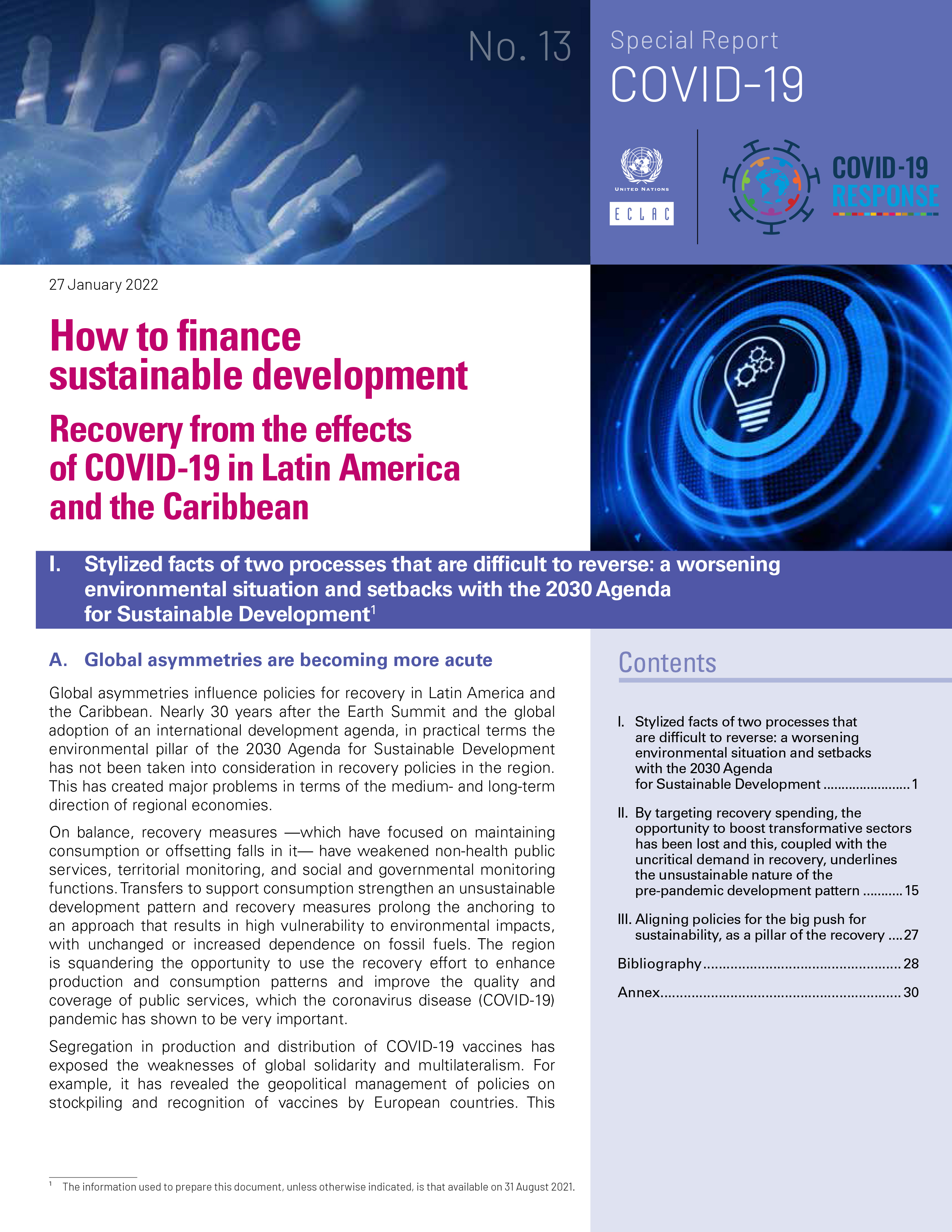
How to Finance Sustainable Development
Recovery From the Effects of Covid-19 in Latin America and the Caribbean
Global asymmetries influence policies for recovery in Latin America and the Caribbean. Nearly 30 years after the Earth Summit and the global adoption of an international development agenda, in practical terms the environmental pillar of the 2030 Agenda for Sustainable Development has not been taken into consideration in recovery policies in the region. This has created major problems in terms of the medium- and long-term direction of regional economies. On balance, recovery measures —which have focused on maintaining consumption or offsetting falls in it— have weakened non-health public services, territorial monitoring, and social and governmental monitoring functions. Transfers to support consumption strengthen an unsustainable development pattern and recovery measures prolong the anchoring to an approach that results in high vulnerability to environmental impacts, with unchanged or increased dependence on fossil fuels. The region is squandering the opportunity to use the recovery effort to enhance production and consumption patterns and improve the quality and coverage of public services, which the coronavirus disease (COVID-19) pandemic has shown to be very important. This Special Report is the thirteenth in a series prepared by the Economic Commission for Latin America and the Caribbean (ECLAC) on the evolution and impacts of the COVID-19 pandemic in Latin America and the Caribbean.
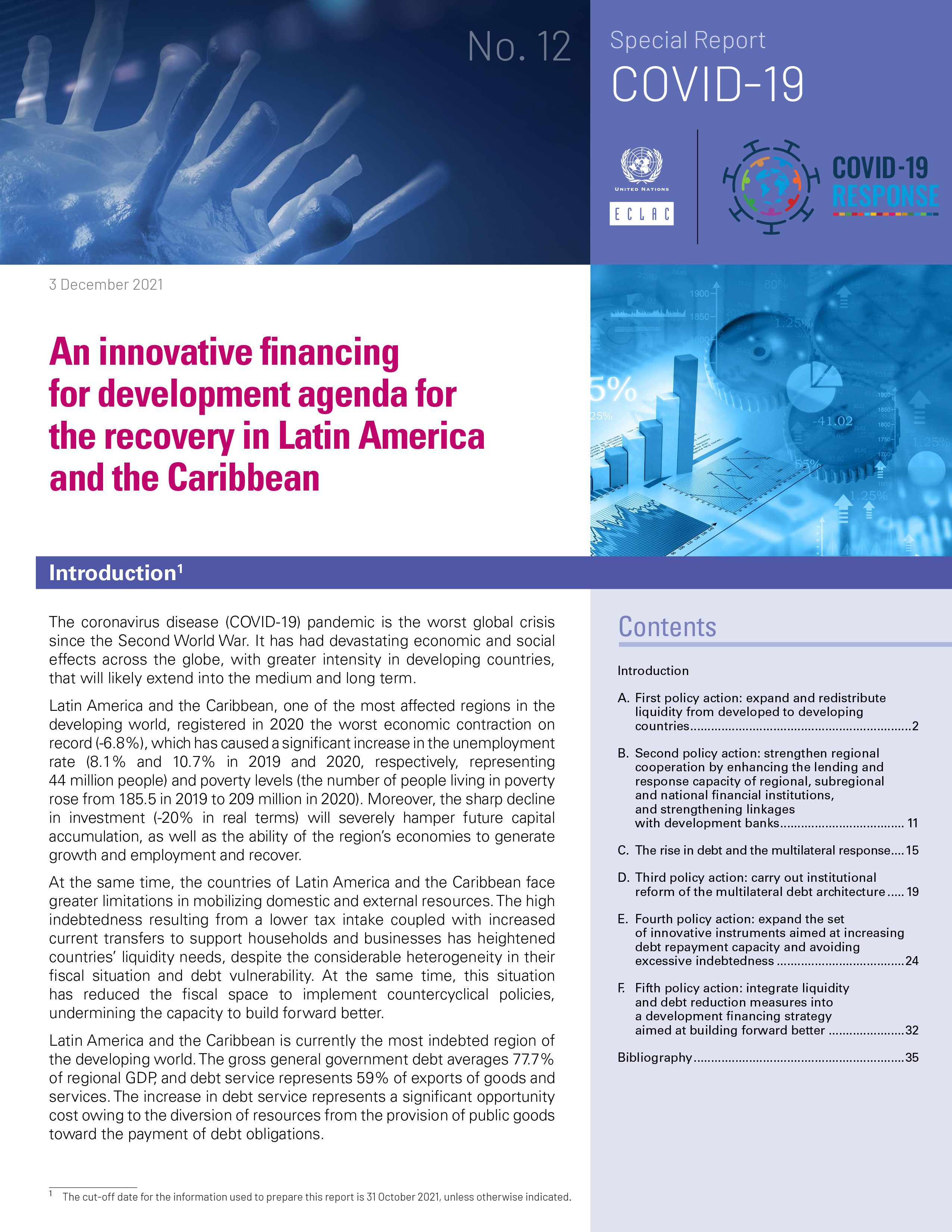
An Innovative Financing for Development Agenda for The Recovery in Latin America and the Caribbean
The coronavirus disease (COVID-19) pandemic is the worst global crisis since the Second World War. It has had devastating economic and social effects across the globe, with greater intensity in developing countries, that will likely extend into the medium and long term. Latin America and the Caribbean, one of the most affected regions in the developing world, registered in 2020 the worst economic contraction on record (-6.8%), which has caused a significant increase in the unemployment rate (8.1% and 10.7% in 2019 and 2020, respectively, representing 44 million people) and poverty levels (the number of people living in poverty rose from 185.5 in 2019 to 209 million in 2020). Moreover, the sharp decline in investment (-20% in real terms) will severely hamper future capital accumulation, as well as the ability of the region’s economies to generate growth and employment and recover.
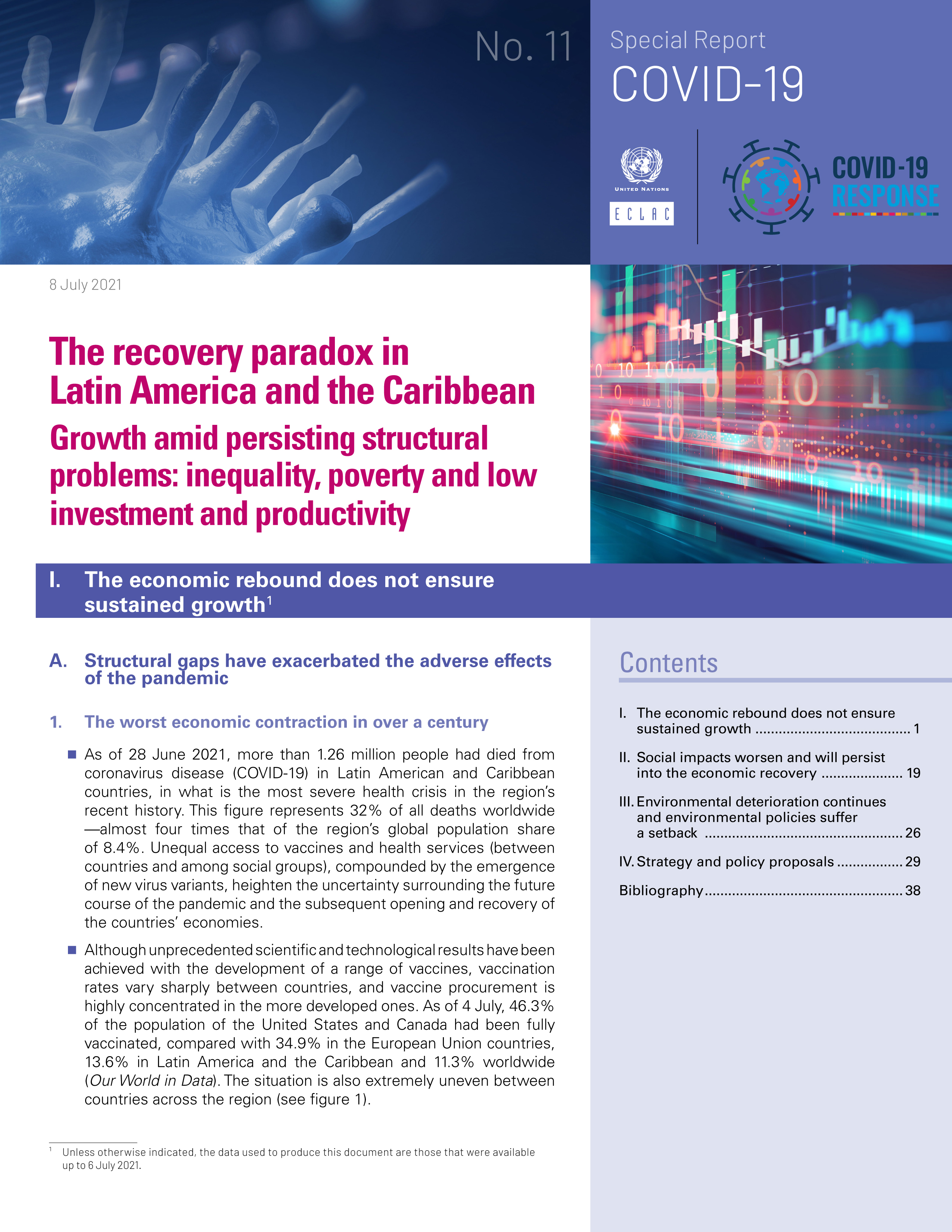
The Recovery Paradox in Latin America and the Caribbean Growth Amid Persisting Structural Problems
Inequality, Poverty and Low Investment and Productivity
This Special Report examines the economic and social impact of the COVID-19 pandemic, more than a year after it first appeared, providing new growth projections for the region’s countries. The document, entitled The recovery paradox in Latin America and the Caribbean. Growth amid persisting structural problems: inequality, poverty and low investment and productivity, analyzes the performance of the region’s main economic and social indicators and presents policy proposals for achieving a transformative recovery based on the forging of a new development pattern.
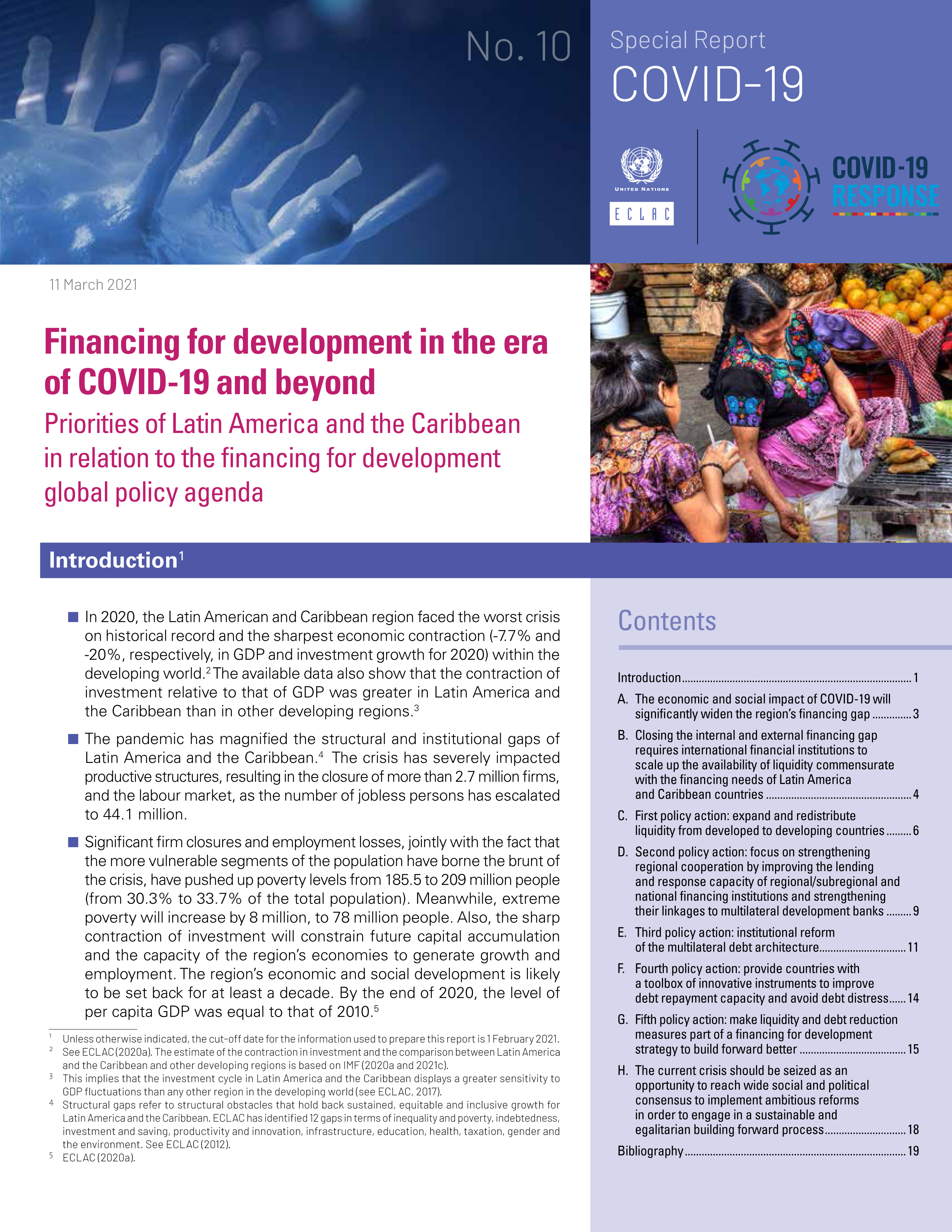
Financing for Development in the Era of COVID-19 and Beyond
Special Report COVID-19 No. 10
In 2020, the Latin American and Caribbean region faced the worst crisis on historical record and the sharpest economic contraction (-7.7% and -20%, respectively, in GDP and investment growth for 2020) within the developing world. The available data also show that the contraction of investment relative to that of GDP was greater in Latin America and the Caribbean than in other developing regions. The pandemic has magnified the structural and institutional gaps of Latin America and the Caribbean. The crisis has severely impacted productive structures, resulting in the closure of more than 2.7 million firms, and the labour market, as the number of jobless persons has escalated to 44.1 million. Significant firm closures and employment losses, jointly with the fact that the more vulnerable segments of the population have borne the brunt of the crisis, have pushed up poverty levels from 185.5 to 209 million people (from 30.3% to 33.7% of the total population). Meanwhile, extreme poverty will increase by 8 million, to 78 million people. Also, the sharp contraction of investment will constrain future capital accumulation and the capacity of the region’s economies to generate growth and employment. The region’s economic and social development is likely to be set back for at least a decade. By the end of 2020, the level of per capita GDP was equal to that of 2010.
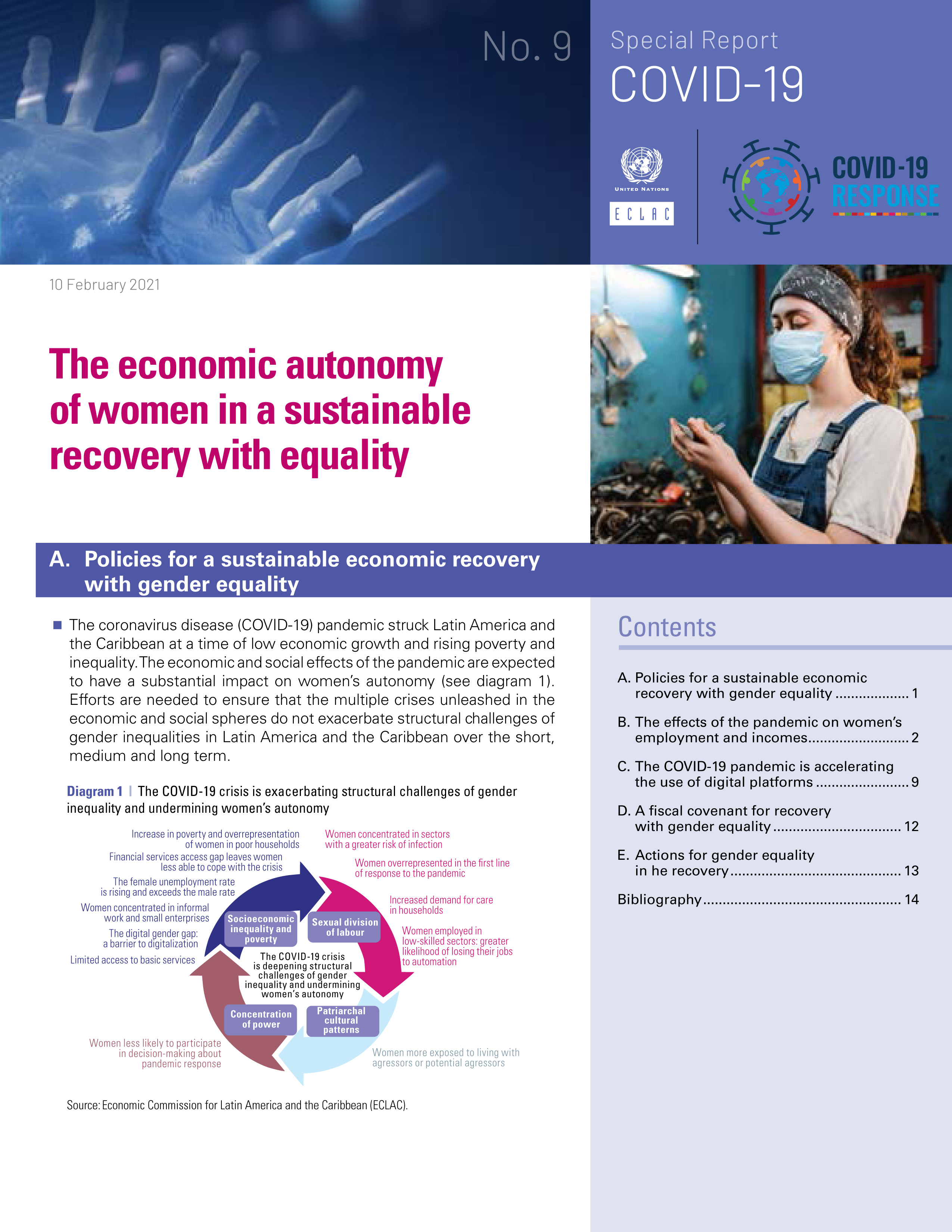
The Economic Autonomy of Women in a Sustainable Recovery with Equality
Special Report COVID-19 No. 9
The crisis caused by the COVID-19 pandemic has had a negative impact on employment and labor conditions for women in Latin America and the Caribbean, generating a setback of more than a decade in terms of the progress achieved in labor market participation. The rate of job market participation by women was at 46% in 2020, while for men it was 69%. It is further estimated that the unemployment rate for women reached 12% in 2020, a percentage that rises to 22.2% if we factor in women’s participation in the labor force in 2019. In 2020 there was a mass exodus of women from the labor force, who have not returned to search for employment, having to attend to care demands at home. 56.9% of women in Latin America and 54.3% in the Caribbean are employed in sectors where the pandemic is expected to have a higher negative impact in terms of employment and income. The women of the region are a crucial part of the frontline response to the pandemic. Some 73.2% of people employed in the health sector are women, who have had to face extreme working conditions such as long work days, in addition to increased risk of contagion as health personnel. All of this in a regional context in which salary discrimination persists, where salaries for women who work in the health sector are 23.7% less than men’s in the same sector. In addition to having a gender perspective that cuts across all recovery policies, affirmative actions are required in the areas of fiscal, labor, productive, economic and social policies to protect the rights of women achieved in the past decade, prevent setbacks and take on gender inequalities in the short, medium and long terms.
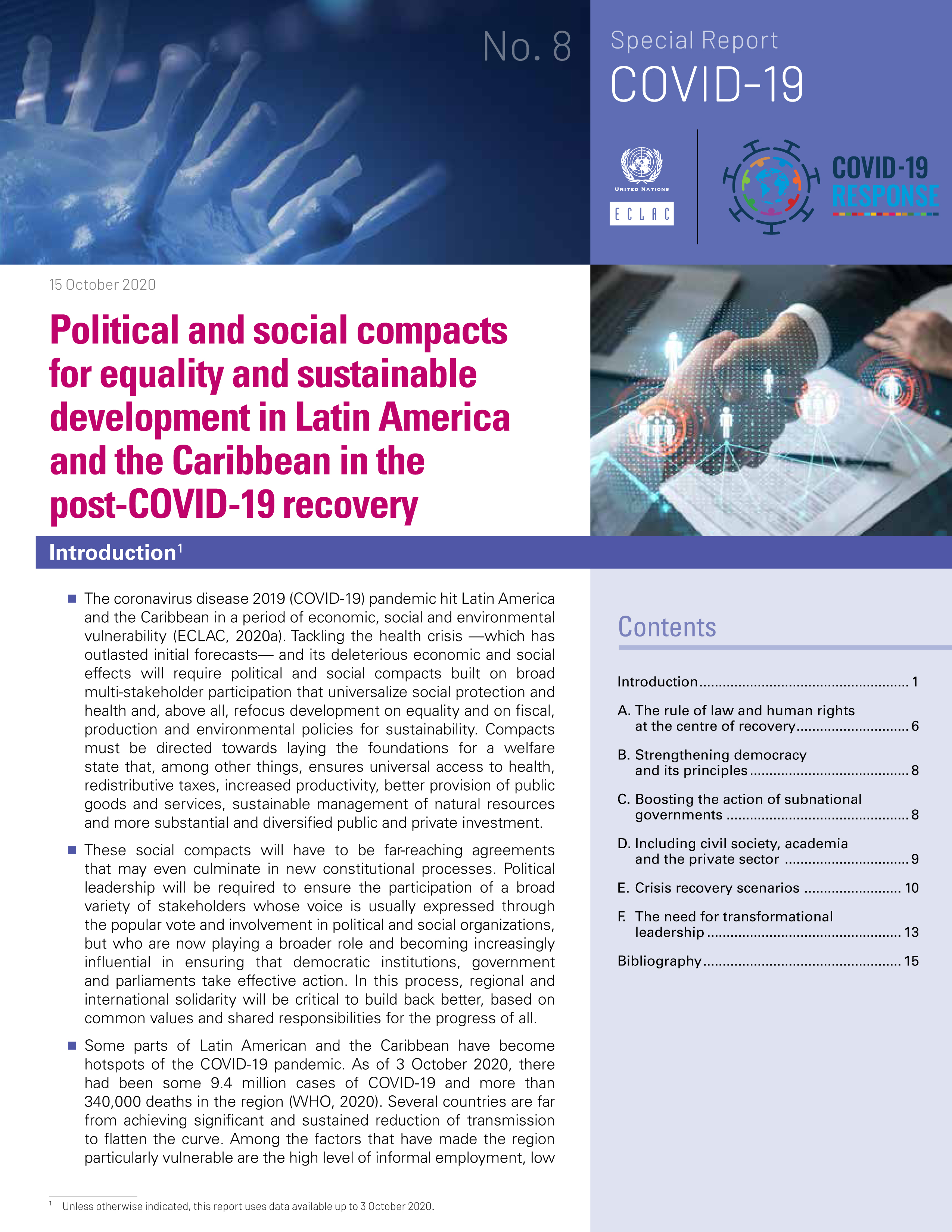
Political and Social Compacts for Equality and Sustainable Development in Latin America and the Caribbean in the Post-COVID-19 Recovery
Special Report COVID-19 No. 8
The coronavirus disease 2019 (COVID-19) pandemic hit Latin America and the Caribbean in a period of economic, social and environmental vulnerability. Tackling the health crisis —which has outlasted initial forecasts— and its deleterious economic and social effects will require political and social compacts built on broad multi-stakeholder participation that universalize social protection and health and, above all, refocus development on equality and on fiscal, production and environmental policies for sustainability. Compacts must be directed towards laying the foundations for a welfare state that, among other things, ensures universal access to health, redistributive taxes, increased productivity, better provision of public goods and services, sustainable management of natural resources and more substantial and diversified public and private investment.
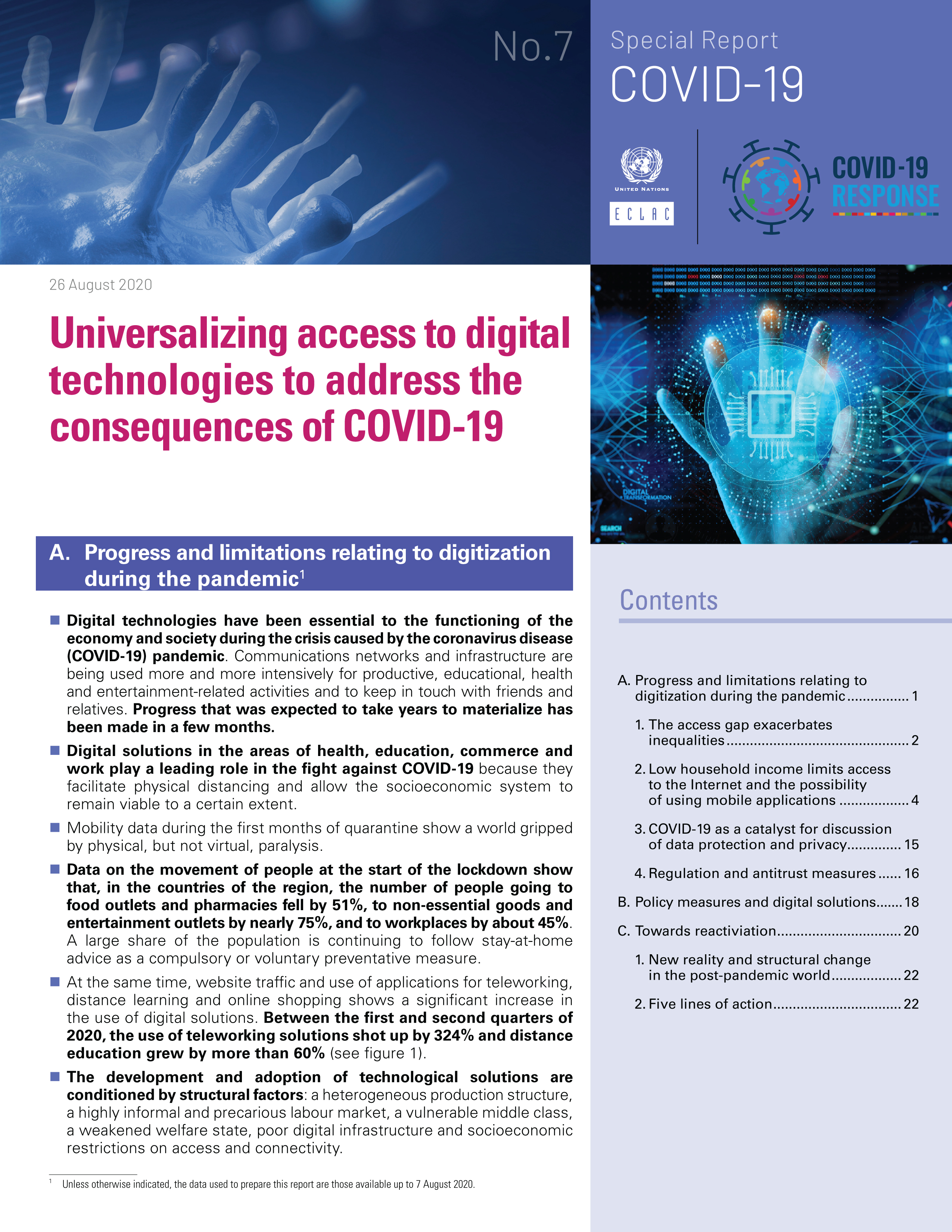
Universalizing Access to Digital Technologies to Address the Consequences of COVID-19
Special Report COVID-19 No. 7
This Special Report is the seventh in a series by the Economic Commission for Latin America and the Caribbean (ECLAC) on the evolution and impacts of the COVID-19 (coronavirus) pandemic in Latin America and the Caribbean. It examines the key role of digital technologies in the pandemic prompted by the coronavirus and how gaps in access, affordability and network speed deepen the inequalities and vulnerabilities of the region’s population. It also analyzes the advances and limitations of digitalization and assesses how digital solutions reduce the impact of measures aimed at containing the virus, such as lockdowns and social distancing. Finally, the document proposes measures in the area of connectivity and the digital economy for an inclusive reactivation.
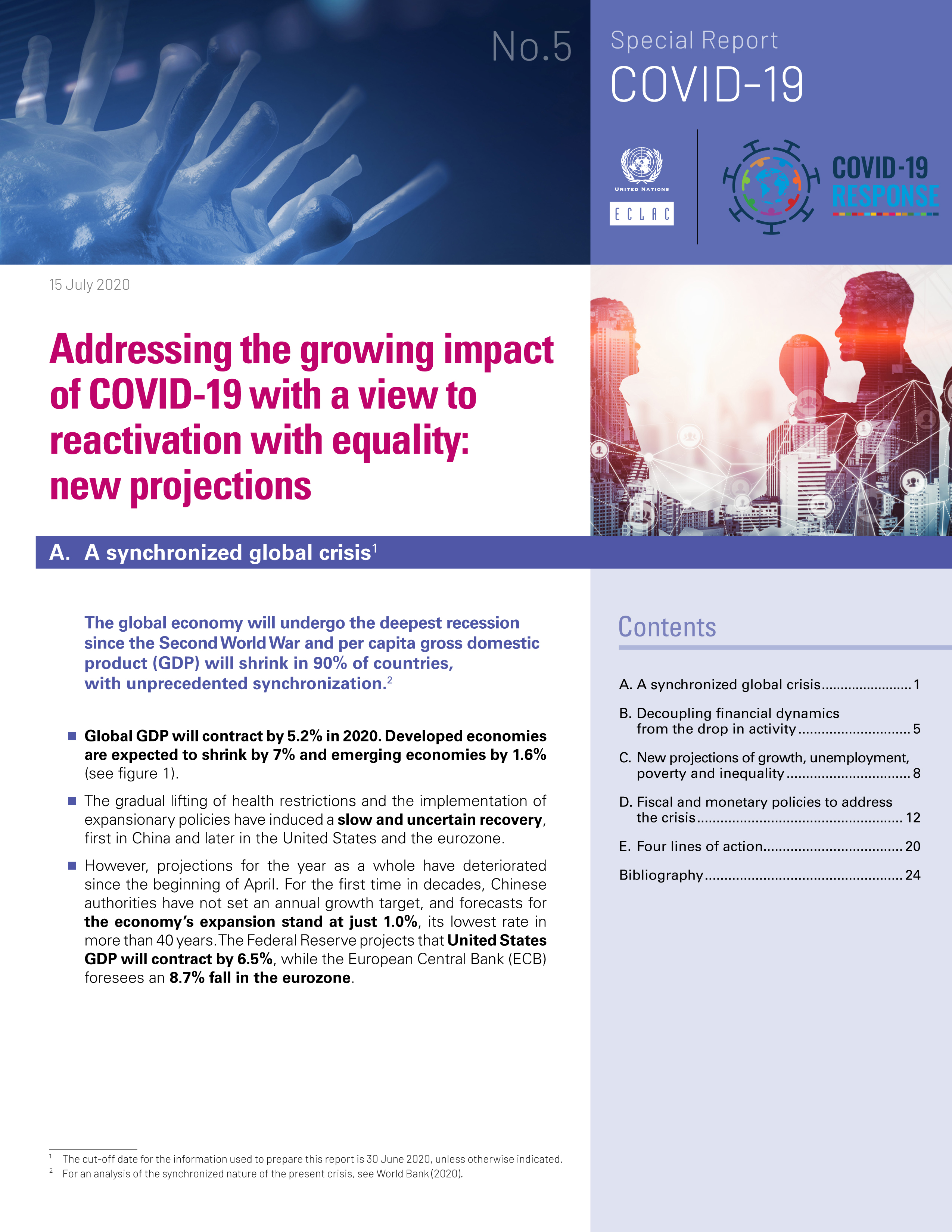
Addressing the Growing Impact of COVID-19 with a View to Reactivation with Equality: New Projections
Special Report COVID-19 No. 5
This Special Report is the fifth in this series on the evolution and impacts of the COVID-19 (coronavirus) pandemic in Latin America and the Caribbean. The key messages are: Economic activity in the world is falling by more than what was foreseen several months ago as a result of the crisis stemming from the coronavirus disease (COVID-19), and this increases negative external effects on Latin America and the Caribbean through trade channels, the terms of trade, tourism and remittances. In addition, the region is currently at the epicenter of the pandemic, and while some governments have begun to lift measures to contain its spread, others have had to keep them in place or even redouble them due to the persistent daily uptick in cases. Since both external and domestic shocks have intensified, the region will experience a -9.1% fall in Gross Domestic Product (GDP) in 2020. It is expected that the regional unemployment rate will be around 13.5% by the end of 2020, which represents an upward revision (2 percentage points) of the estimate presented in April and a 5.4 percentage point increase versus the 2019 figure (8.1%). ECLAC forecasts that the number of people living in poverty will rise by 45.4 million in 2020, which means that the total number of people in that situation will go from 185.5 million in 2019 to 230.9 million people in 2020 – a figure that represents 37.3% of Latin America’s population. Countries in the region have announced major packages of fiscal measures to confront the health emergency and mitigate its social and economic effects. National efforts must be supported by international cooperation to expand policy space through increased financing under favorable conditions and debt relief. Likewise, making progress on equality is crucial for effectively controlling the pandemic and for a sustainable economic recovery in Latin America and the Caribbean.
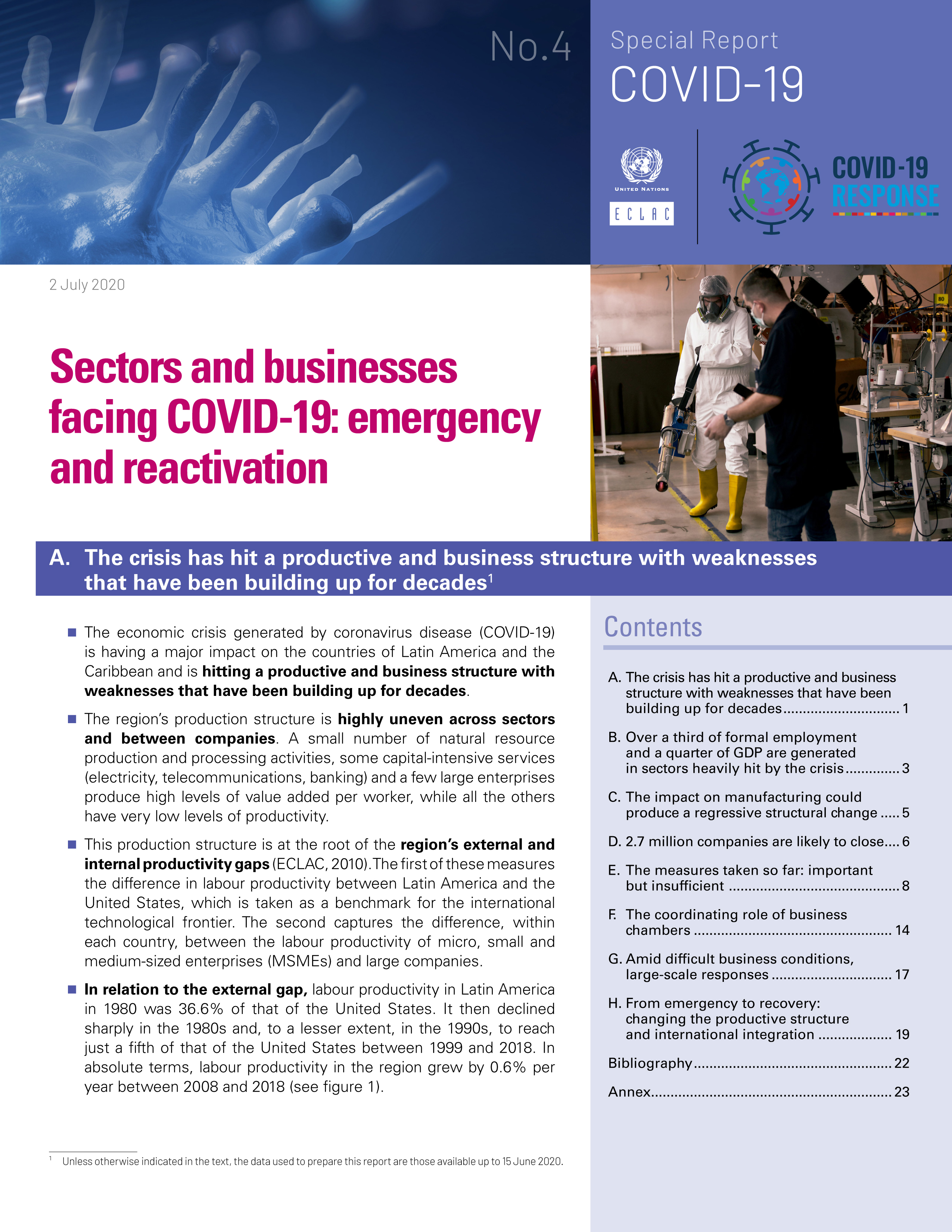
Sectors and Businesses Facing COVID-19: Emergency and Reactivation
Special Report COVID-19 No. 4
This Special Report is the fourth in this series on the evolution and impacts of the COVID-19 pandemic in Latin America and the Caribbean. The economic crisis generated by coronavirus disease (COVID-19) is having a major impact on the countries of Latin America and the Caribbean and is hitting a productive and business structure with weaknesses that have been building up for decades. Before the pandemic, the region’s production structure already showed great structural heterogeneity that seriously limited its economic development possibilities. The pandemic makes these weaknesses more evident and amplifies economic, social and environmental tensions. In the arena of production, it is urgent to mitigate capacity destruction, without neglecting the need for a sustained increase in productivity, the generation of productive linkages and increased learning and the generation and dissemination of innovations. In this context, manufacturing is of strategic importance and must play a leading role in the growth process and in changing the productive matrix. This requires policies to change the production structure. In other words, incentives other than those that currently prevail for private companies, together with the State, to make the necessary investments to diversify the economic structure, ensure a continuous and stable growth process and avoid social and environmental setbacks.
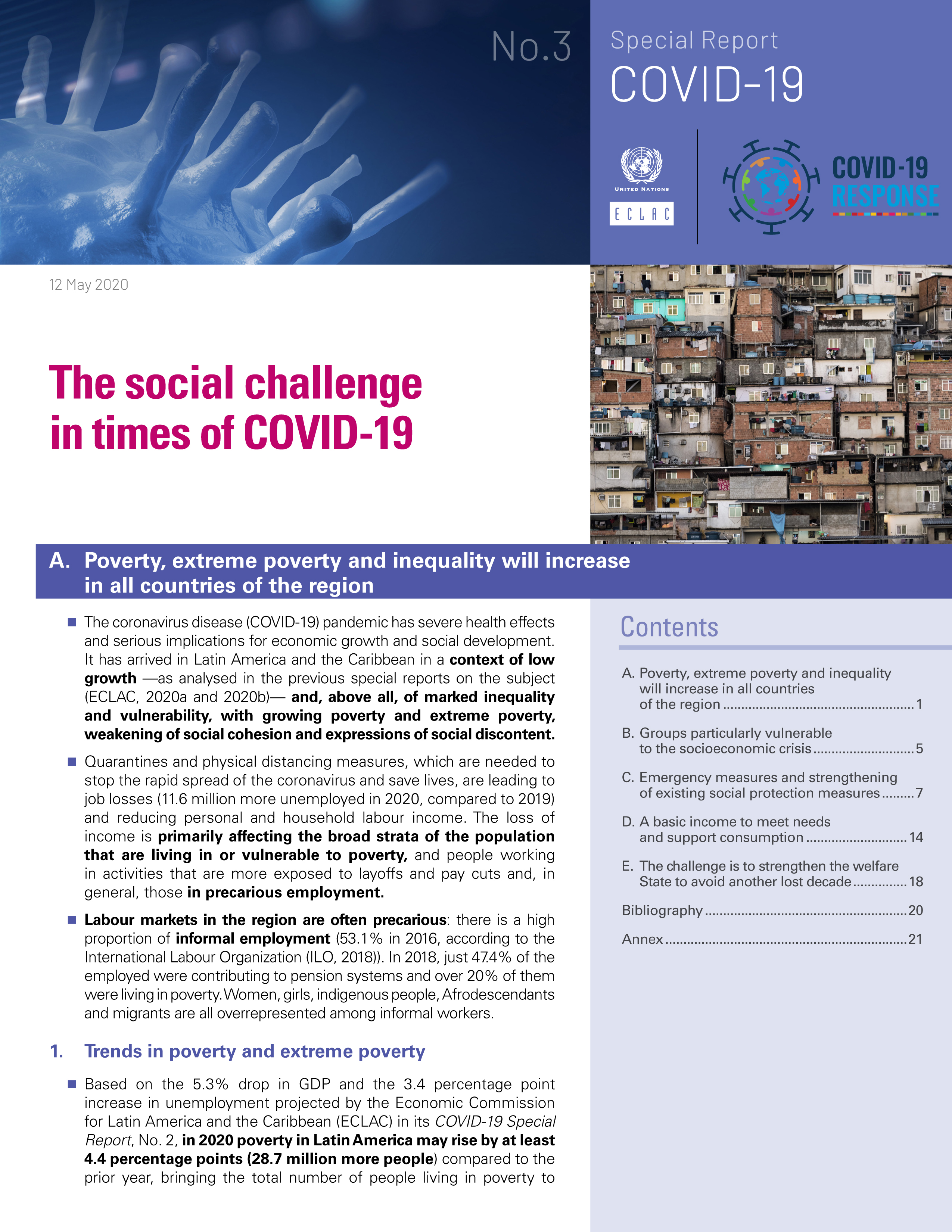
The Social Challenge in Times of COVID-19
Special Report COVID-19 No. 3
This Special Report is the third in this series on the evolution and impacts of the COVID-19 pandemic in Latin America and the Caribbean. The coronavirus disease (COVID-19) pandemic has severe health effects and serious implications for economic growth and social development. It has arrived in Latin America and the Caribbean in a context of low growth —as analysed in the previous special reports on the subject— and, above all, of marked inequality and vulnerability, with growing poverty and extreme poverty, weakening of social cohesion and expressions of social discontent. Quarantines and physical distancing measures, which are needed to stop the rapid spread of the coronavirus and save lives, are leading to job losses (11.6 million more unemployed in 2020, compared to 2019) and reducing personal and household labour income. The loss of income is primarily affecting the broad strata of the population that are living in or vulnerable to poverty, and people working in activities that are more exposed to layoffs and pay cuts and, in general, those in precarious employment. In view of the major persistent gaps that the pandemic has widened, ECLAC reiterates that it is time to implement universal, redistributive and solidarity-based policies with a rights-based approach, to ensure that no one is left behind.
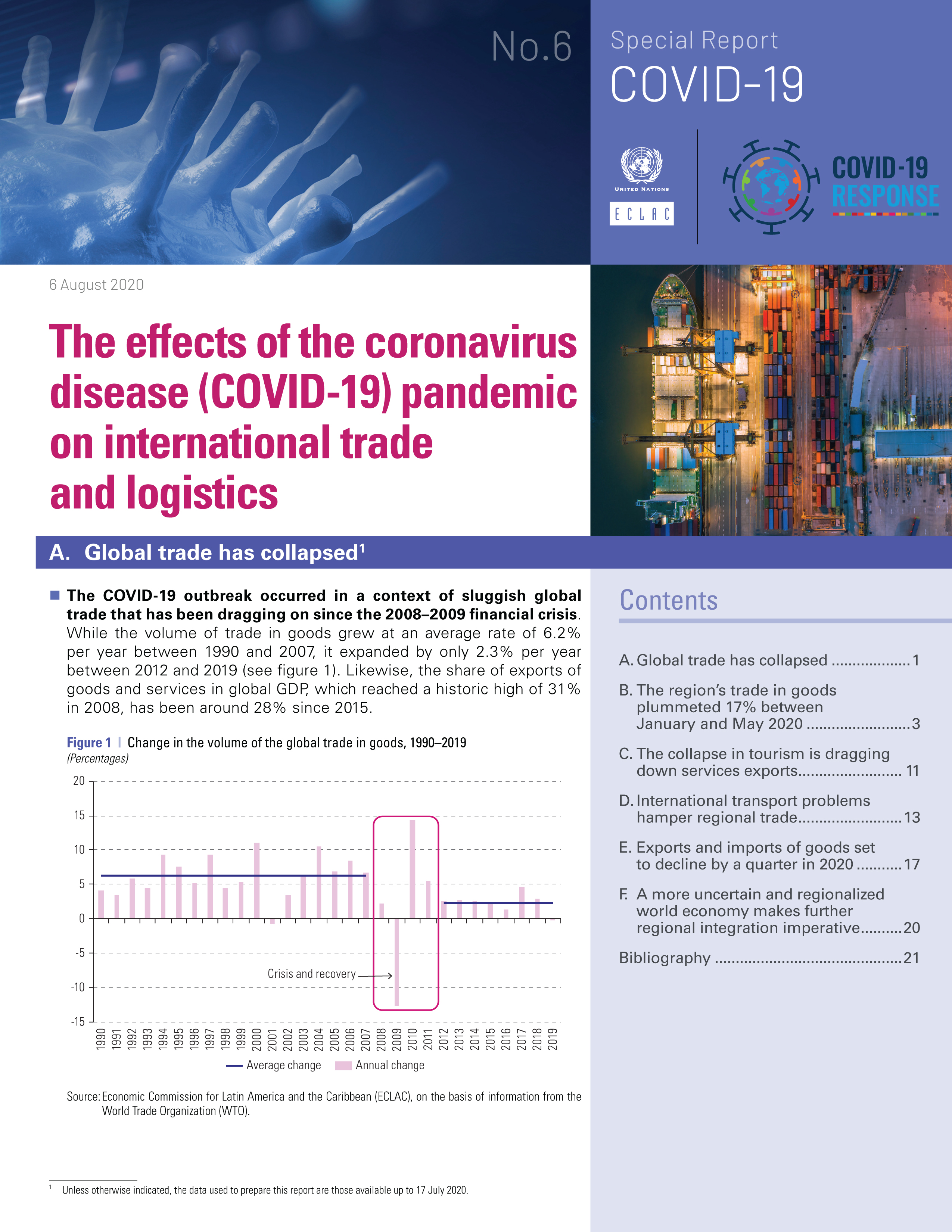
The Effects of the Coronavirus Disease (COVID-19) Pandemic on International Trade and Logistics
Special Report COVID-19 No. 6
This Special Report is the sixth in a series by the Economic Commission for Latin America and the Caribbean (ECLAC) on the evolution and impacts of the COVID-19 (coronavirus) pandemic in Latin America and the Caribbean. It includes estimates regarding the pandemic’s impact on exports, imports, transportation and logistics in the region’s countries. The COVID-19 (coronavirus) outbreak occurred in a context of sluggish global trade that has been dragging on since the 2008–2009 financial crisis. The rapid spread of COVID-19 (coronavirus) and the measures taken by governments to contain it have had serious consequences for the world’s major economies. Many productive activities have been disrupted, first in Asia and then in Europe, North America and the rest of the world, and there have been widespread border closures. This has resulted in a steep rise in unemployment, especially in the United States, with a consequent reduction in demand for goods and services. Against this backdrop, global GDP in 2020 is expected to register its sharpest contraction since the Second World War. In this situation, the volume of global trade in goods fell by 17.7% in May 2020 compared with the same month in 2019 The drop in the first five months of the year was widespread, although it particularly affected exports from the United States, Japan, and the European Union. The economic contraction in China was smaller than the global average, as that country controlled the outbreak and reopened its economy relatively quickly. Latin America and the Caribbean is the most affected developing region. In a global context of increased production regionalization, regional integration must play a key role in the crisis-recovery strategies in Latin America and the Caribbean. To move forward with regional integration, infrastructure and logistics must be included in economic recovery packages. In addition to their sizeable direct contributions to GDP and employment, infrastructure and logistics are essential for the production of all goods and services, the supply of food and essential services, and international trade competitiveness.
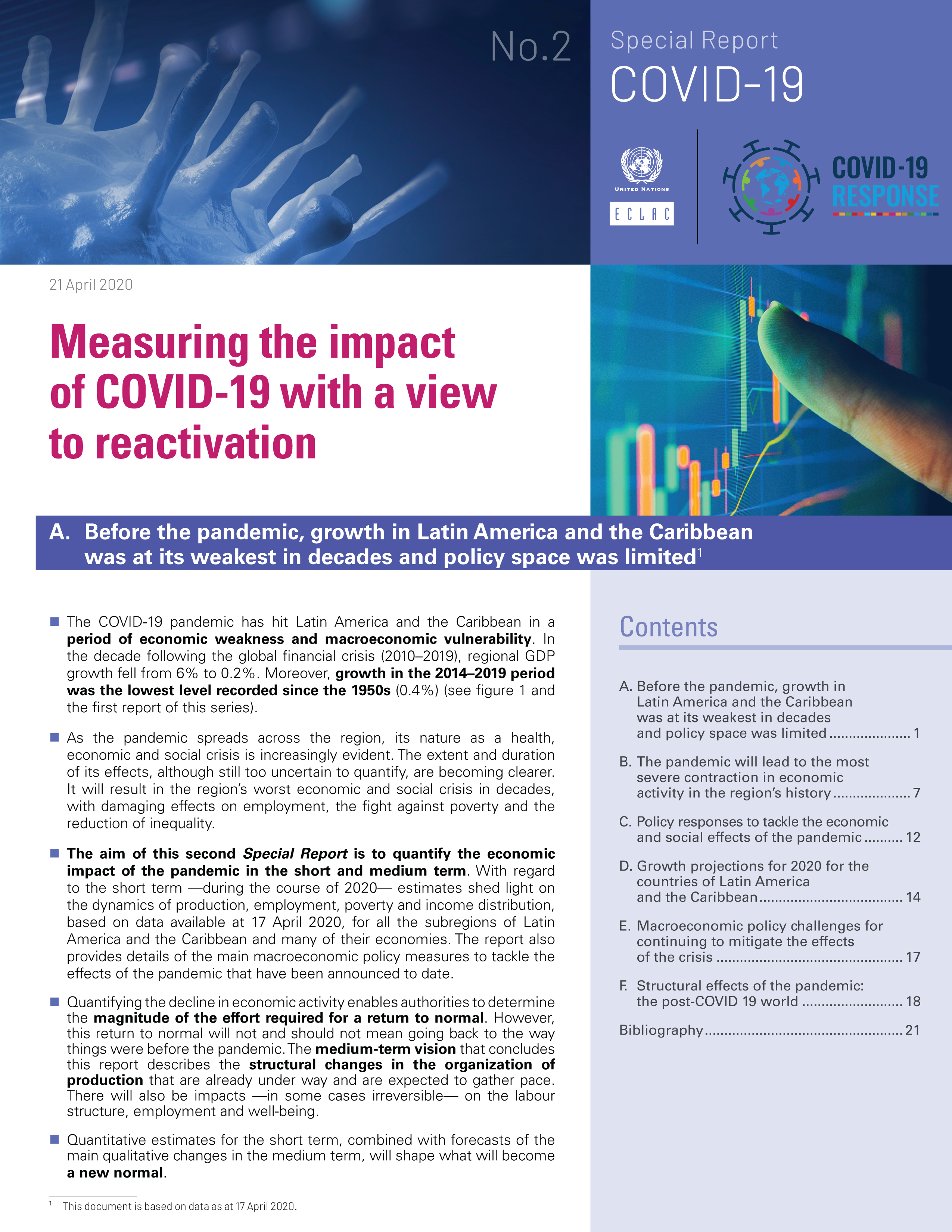
Measuring the Impact of COVID-19 with a View to Reactivation
Special Report COVID-19 No. 2
The aim of this second Special Report is to quantify the economic impact of the COVID-19 (coronavirus) pandemic in the short and medium term. With regard the short term —during the course of 2020— estimates shed light on the dynamics of production, employment, poverty and income distribution, based on data available at 17 April 2020, for all the subregions of Latin America and the Caribbean and many of their economies. The report also provides details of the main macroeconomic policy measures to tackle the effects of the pandemic that have been announced to date. Quantifying the decline in economic activity enables authorities to determine the magnitude of the effort required for a return to normal. However, this return to normal will not and should not mean going back to the way things were before the pandemic. The medium-term vision that concludes this report describes the structural changes in the organization of production that are already under way and are expected to gather pace. There will also be impacts —in some cases irreversible— on the labour structure, employment and well-being. Quantitative estimates for the short term, combined with forecasts of the main qualitative changes in the medium term, will shape what will become a new normal.
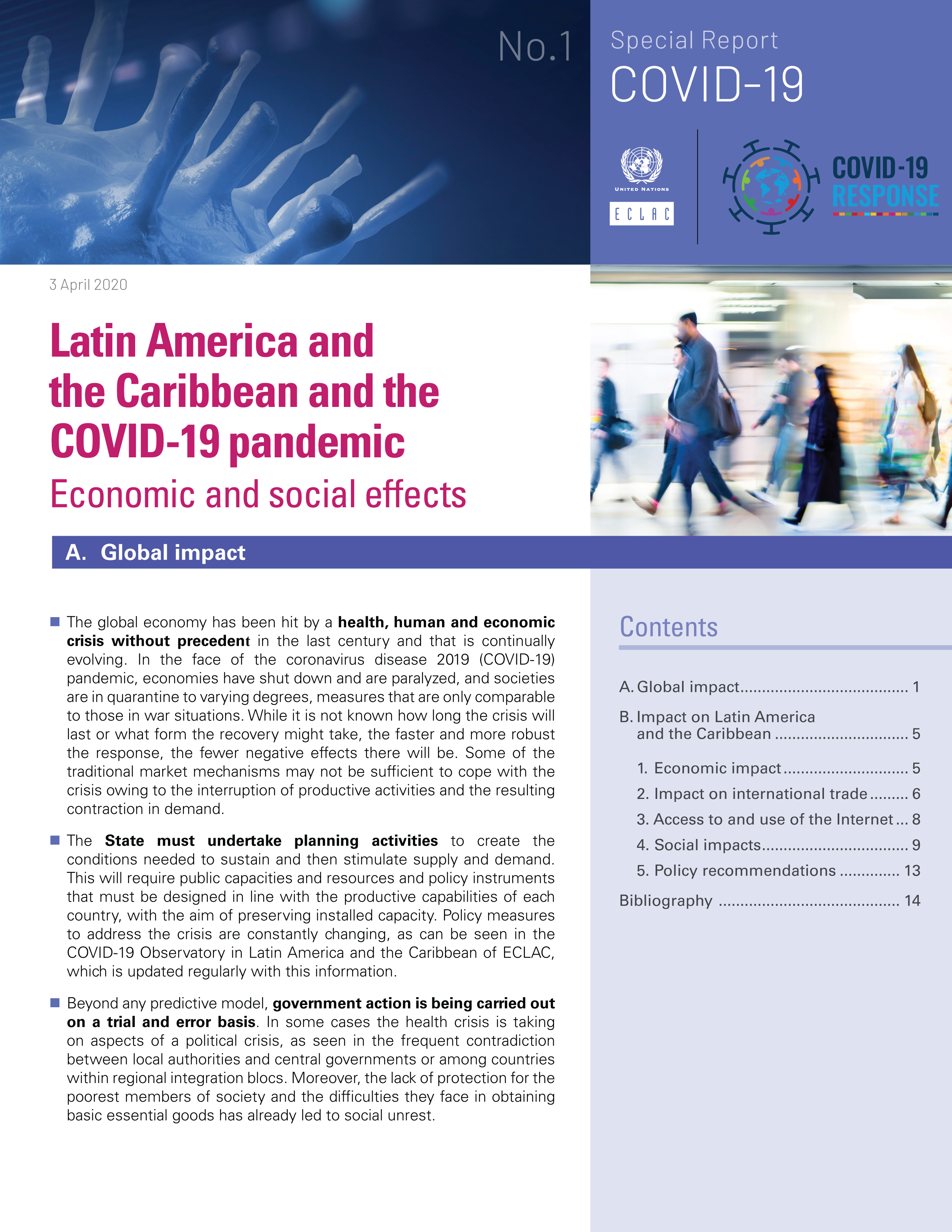
Latin America and the Caribbean and the COVID-19 Pandemic: Economic and Social Effects
Special Report COVID-19 No. 1
This Special Report is the first in a series by the Economic Commission for Latin America and the Caribbean (ECLAC) on the evolution and impacts of the COVID-19 (coronavirus) pandemic in Latin America and the Caribbean, and will update the economic and social analysis as the relevant information becomes available. The preparation of the Report will be headed by the Executive Secretary of ECLAC, Alicia Bárcena, with the technical support of the Office of the Deputy Executive Secretary, Mario Cimoli, and the substantive divisions responsible for the topics addressed, as well as the subregional headquarters and country offices of ECLAC.
